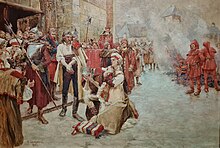Croatian–Slovene peasant revolt
| Croatian–Slovene Peasant Revolt | |||||||
|---|---|---|---|---|---|---|---|
 A non-contemporary representation of the execution of Matija Gubec at the square in front of st. Mark's Church in Zagreb, by Oton Iveković (1912) |
|||||||
|
|||||||
| Belligerents | |||||||
| Croatian and Slovene peasants | Croatian, Styrian and Carniolan nobility Uskoks |
||||||
| Commanders and leaders | |||||||
|
Matija Gubec Ilija Gregorić Ivan Pasanec Nikola Kupinić |
Gašpar Alapić Josip Thurn |
||||||
| Strength | |||||||
| 8,000-12,000 peasants | 5,000 soldiers | ||||||
| Casualties and losses | |||||||
| 3,000-5,000 killed | |||||||
The Croatian–Slovene Peasant Revolt (Slovene: hrvaško-slovenski kmečki upor), Gubec's Rebellion (Croatian: Gupčeva buna) or Gubec's peasant uprising of 1573 was a large peasant revolt in the territory that nowadays belongs to Croatia and Slovenia. The revolt, sparked by cruel treatment of serfs by Baron Ferenc Tahy, ended after 12 days with the defeat of the rebels and bloody retribution by the nobility.
In the late 16th century, the threat of Ottoman incursions strained the economy of the southern flanks of the Holy Roman Empire, and feudal lords continually increased their demands on the peasantry. In Croatian Zagorje, this was compounded by cruel treatment of peasants by baron Ferenc Tahy and his warring with neighbouring barons over land. When multiple complaints to the emperor went unheard, the peasants conspired to rebel with their peers in the neighbouring provinces of Styria and Carniola and with the lower classes of townspeople.
The rebellion broke out simultaneously in large parts of Croatia, Styria, and Carniola on 28 January 1573. The rebels' political program was to replace the nobility with peasant officials answerable directly to the emperor, and to abolish all feudal holdings and obligations of the Roman Catholic Church. A peasant government was formed with Matija Gubec, Ivan Pasanac and Ivan Mogaić as members. Far-reaching plans were drawn up, including abolition of provincial borders, opening of highways for trade, and self-rule by the peasants.
...
Wikipedia
